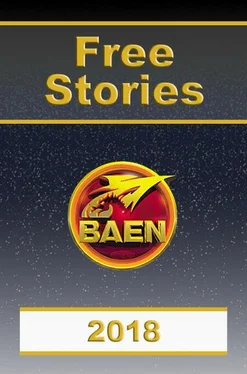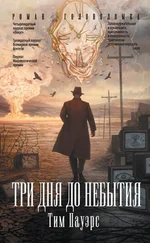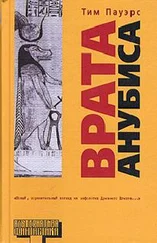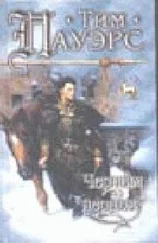It was not a river. It was a lake. It was an immense lake. How they’d gotten here, where they were, when they were, these and so many other questions were too vast and numerous to be grasped in the moment; there was only one thing of which he could be absolutely, completely, categorically certain.
“Don’t say it,” Lachs warned. So Lachs knew, too. He and Goond had seen the same movie, after all, in 1939 at Grauman’s Chinese Theater in California with their hosts from the local German community, just before they’d had to hurry home to Germany, just before the declaration of war.
But Goond had to say it. The conviction grew in his mind into an imperative of Irresistable force. “I mean it,” Lachs said. “I’m not joking. Don’t.”
It was no good. Not all of his training, not all of his self-discipline, not all of his affection for Lachs as a friend and respect for Lachs as his commanding officer, not all of his conviction that Lachs was going to kill him if he said it could stop him now. He was cursed to say the words, and die.
Weren’t they all cursed? Was this the revenge of the ghost ship, was this the fate to which they had been condemned since the moment they had all seen that phantom off the west coast of Africa three years ago? Was this the curse of the Fliegende Höllander , the Flying Dutchman ?
“Toto,” Goond said. Teeth clenched and eyes flashing Lachs snarled through clenched teeth don’t say it don’t say it don’t say it, but not even that could stop Goond now. It was his doom. There was no help for it. “I’ve a feeling we’re not in Kansas anymore.”
Lachs clenched his gloved and ungloved hand alike into fists and shook them at the sky in outraged protest, crying out “Alarm!” with impassioned determination. Dive .
They all fell down the hatch and through the conning tower to the decking of the command center below, but not without a thorough drenching before Goond could get the hatch secured. Because the water was calm but the boat sank that much more willingly and readily and quickly in fresh water. They were heavier here. Vilsohn had already noticed the difference, Vilsohn was the engineer, it was his business to notice such things.
Vilsohn would assume there was some undetected damage in the ballast tanks, taking on water prematurely, weighing them down. There might well be. But that was not the reason. “We say nothing as yet,” Goond told his watch, quietly, as the controlled chaos of an emergency dive exploded all around them. “We give Herr Kahloin time to chew on this, yes?”
And to sink down into the comfort of a familiar environment, a watery one, to give themselves time to process what they’d seen. But now Goond knew why he’d been dreaming of that evil day. They had seen the Flying Dutchman ; they’d taken the cursed packet of letters offered them. But they hadn’t actually touched hands. Did that mean they were only partially cursed? Was that why they found themselves here in fresh water under the light of a full Moon, and not dead on the bottom of the Arctic ocean?
Goond fled from Zentral to the radio room to evade Lachs’ wrath and see whether Bentzien could find an answer to where, what, when, and why that did not bear the towering sails and cursed habilments of the Fliegende Höllander .
* * *
Verricht Lachs leaned up against the jamb of the doorway into the radio room, tiny as it was, listening as his radio-man—it was Zoller’s watch—tried to find the signal from the Goliath high-frequency transmitter, trying to make contact with U-boat Command. There should be a transmission. Goliath sent regular updates. Command sent a registry signal over VLF as well, a comfortingly familiar point of contact with their homeland.
They’d never replied—there was danger in that. The Allies were listening, and though the enemy could not cover the entire ocean, if you were the boat unfortunate enough to be caught on intercept you were found. But they should be able to hear Goliath. Shouldn’t they?
The Western Allies had landed in Europe in June, last year. It was February. The Soviets had been advancing from the east. Was Goliath overrun? Because if Goliath had been captured, by whose army? And what had become of Berlin itself?
Nothing. Zoller tracked slowly across the twelve-meter band, listening for anything. Even the English propaganda stations would be worth something, a point of reassuring contact with reality as they understood it, some solid evidence that they had not simply fallen somehow off the map of the world. Zoller had already scanned and scanned for weather reports, because there should be some explanation for how a wintery Arctic environment had resolved within less than two days to a so much milder temperature, cold, but calm, the Moon phase impossibly and inexplicably advanced.
No weather report could explain the turning of the entire ocean from salt to fresh. Lachs had only the wildest surmises to explain that. German scientists had been working on some astounding breakthroughs in weaponry; the Old Lion, Admiral Dönitz, assured them of that with increasing urgency and sincerity, even as the credibility of their beloved commander declined.
So the Allies logically been doing the same as well. Could the first deployment of some cataclysmic doomsday weapon have so altered the chemical balance of the arctic waters that they were as fresh? If that was the answer, could it not explain the silence of the radio equally as well, something had gone wrong, Goliath gone mute, radio traffic stunned into silence by an incomprehensible catastrophe?
“Twenty meter band,” Lachs suggested. Zoller switched to the main receiver; then suddenly Zoller found a channel. A crescendo of radio contacts piling up on either side of a control frequency like an avalanche that was relentless, almost terrible in its density. Code, in blinding speed. Data pairs. The operational shorthand he’d learned during his school days with the radio program offered through the Hitler Youth, British convention for hailing, CQ, CQ, CQ, all signs repeated in rapid bursts.
Lachs thought he knew what they were hearing: had the world not been at war it could be a contest, one of the great joys of the amateur radio service. Operators from all over Europe—from all over the world—would be reaching out to one another along one narrow band, trying to make as many far-flung contacts as they could within some limited period of time. CQ. CQ. CQ. Shorthand in Morse code.
The world was not ended. But apart from that, there was no information to be drawn out of the noise other than that there were people talking to one another, Jim in Milwaukee, Hans in Unterramingen, Toshi in Hitachinaka, Debreeze in Kent.
He was wrong, Lachs realized. It was information. He could hear operators identifying themselves from all over the world. They did not seem to be partitioned by politics: it was hard to imagine Japanese talking to Canadians, French with Russians, Germans with Egyptians without any apparent notice taken, if they were still at war.
Zoller glanced over his shoulder at Lachs, who nodded. Scan on . So intense was the range of signals all aimed for the same frequency that the dropping off of information came as a relief; but now that they’d found traffic, there was more. Much of it incomprehensible, welcome to the Fipps repeater , what was that? Some Allied piece of equipment?
And that was not all. As Zoller scanned further through the twenty-meter band, catching fragments of voice traffic in amongst the familiar music of Morse code, one message seemed to leap out of the transceiver with explosive force for all that Lachs was only listening to the sound from one ear-piece of Zoller’s head-set, that Zoller had left cocked to one side so that the sound could be shared.
Читать дальше








![Тим Пауэрс - Последние дни. Том 2 [litres]](/books/393813/tim-pauers-poslednie-dni-tom-2-litres-thumb.webp)
![Тим Пауэрс - Последние дни. Том 1 [litres]](/books/394090/tim-pauers-poslednie-dni-tom-1-litres-thumb.webp)
![Тим Пауэрс - Последний выдох [litres]](/books/402145/tim-pauers-poslednij-vydoh-litres-thumb.webp)